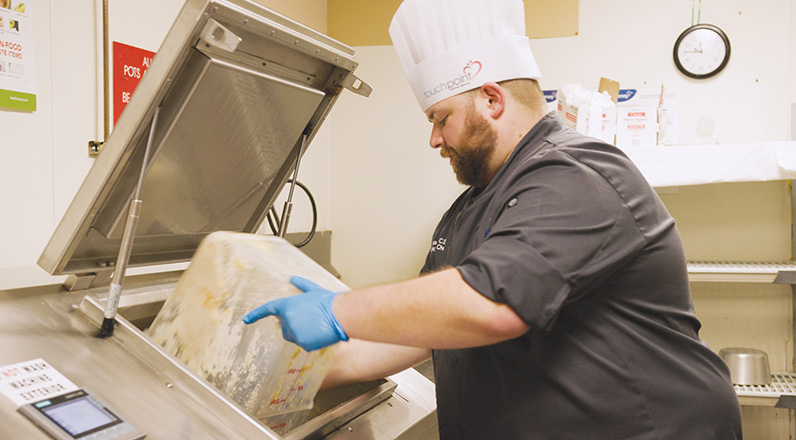
Chase Turgeon, a food and nutrition services associate at Ascension St. Vincent's Riverside in Jacksonville, Florida, adds scraps to a food digester in the hospital's kitchen. The digester is one of 69 installed in kitchens at Ascension hospitals.
In the kitchens of 69 Ascension hospitals, churning, stainless steel food waste digesters are doing their part to help the planet.
Food and nutrition associates feed the digesters leftovers and the scraps made while preparing foods — pineapple tops, apple cores, potato peelings, and, to a lesser extent, chicken bones and meat trimmings.
 Sechrist
Sechrist"We have learned over time that digesters are happier if they are vegetarian," said Lois Sechrist, the manager of sustainability at Ascension and Medxcel, a facilities management subsidiary.
As of early November, the digesters had kept more than 704 tons of waste out of landfills. That's important because food waste is one of the largest emitters of methane, a greenhouse gas emitted from landfills.
 Randazzo
Randazzo"Ascension has a large focus on creating healthier communities, making sure we have a positive impact where we're located," said Bridget Randazzo, a sustainability analyst for Ascension and Medxcel. "So that's also contributing to our mission as well
as serving those that maybe live by a landfill."
Waste diversion
Sechrist said that "as a faith-based health system, Ascension has a responsibility to care for the Earth. That's baked into our mission statement."
The digester program got started in 2021, when a workgroup within Ascension's Environmental Impact and Sustainability program realized that about 15% of the waste Ascension sent to landfills was from food. They set a goal by fiscal year 2023 to reduce
the amount of trash sent to landfills by 6%. They thought the low-hanging fruit — in some cases literally — could be food scraps.
The system installed food digesters in the kitchens at Ascension St. Vincent's Riverside in Jacksonville, Florida, and Ascension Saint Agnes Hospital in Baltimore. At the end of three months, the digesters had diverted 32 tons of scraps from the landfill
and converted it to gray water, which is the generally clean wastewater that comes from household machines like dishwashers and washing machines. The system then figured out which hospital kitchens had the space for a digester, and which hospitals
produced enough waste to make a larger step toward its goal. By the end of July 2022, it had installed 69 digesters in hospitals across the system.
Intermittent feedings
Ascension uses digesters that come in four sizes. The smallest ones can digest up to 15 pounds of food waste an hour; the largest ones can digest up to 100 pounds an hour. They look a little like boxy ice machines.
Workers place the scraps in the digester, and about once a month pour a bottle of microorganisms into the machine. Paddles inside the digester stir and agitate the scraps and microorganisms, the microorganisms digest the scraps, and the resulting gray
water is discharged to wastewater treatment plants.
"You kind of have to feed it slowly," said Sechrist. "That's another good analogy — if you dump it in all at once, you're going to have an upset stomach. You want to do it a little bit through the day."
Valuable metrics
Randazzo said installing the food digesters came with a learning curve for everyone, because it added a step in the process for kitchen associates and Medxcel, which maintains the machines. The communications team
developed posters and quick reference guides with QR codes that hang above the digesters to provide information to staff.
Each digester gives an hourly report of how much waste it is taking in and how much it is producing. Integrating that data with the hospital's information technology network was an added step, said Sechrist. "Adding data tracking provides valuable information
that we didn't fully anticipate," she said.
The food digesters helped kick-start St. Louis-based Ascension's bid to reach big goals: the system is striving to achieve net zero carbon emissions and zero waste by 2040. Randazzo said Ascension knew it could scale up the digesters throughout the whole
system and the machines had been proven to work in various industries for more than 20 years.
Sechrist pointed out that the digesters also help with worker safety because workers are no longer hauling big barrels of food waste to the loading dock every day.
Portion control
Ascension's food and nutrition services supplier, TouchPoint Support Services, also has programs in place to help reduce food waste. One teaches workers how to prep food to minimize waste, such as how to trim a melon
or a roast to get the most food from the item. Workers also arrange food in coolers and on shelves so that the oldest gets used first. Each worker has their own prep station with a scale or bucket to keep track of how much waste they produce.
Dieticians and food staff also work to serve the right food portions in order to reduce leftovers and waste.
Last winter, the Ascension Environmental Impact and Sustainability team made 17 site visits to talk to food service teams and ask about what's working and what's not working. Ascension is "creating ownership and making it part of their work and training
so staff understand that this is important, because food service staff has a lot of turnover," Sechrist said. "We have to engage those associates and include them to listen to their concerns."
Related media: Reducing waste, on-site food prep are priorities for PeaceHealth Southwest hospital